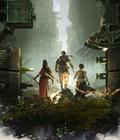Xuan Yuan Sword 7 follows the story of Taishi Zhao, a young man in the Xin Dynasty era of Chinese history. As a child, he saw his parents slaughtered and barely escaped with his newborn sister. Years later, the adult Zhao lives as a mercenary, working to earn enough money to take care of his sickly sister. Unfortunately for him, everything goes wrong quickly as a rogue demon attack leaves his sister dying and his identity exposed. Now he must embark on a quest to save his sister and save them both from the same fate as their parents.
In what is emblematic of the game as a whole, Xuan Yuan Sword 7's story isn't necessarily bad, but it is stunningly average. The characters and plot beats can be predicted, and there isn't a lot to drive interest in the main plot. Some of this may boil down to the translation, which isn't bad but is a bit stiff and sometimes overly literal, making it difficult to get a solid feel for the personality of many characters. The game shines better in its side stories, which often have more interesting plot beats but still aren't super intriguing.
Xuan Yuan Sword 7's combat can best be described as a standard action game for the era. Zhao is armed with a sword and can do light and heavy attacks at the tap of a button. From there, it follows a standard post-Dark Souls formula. You can block and parry, attacks drain your stamina, and if you successfully beat on an enemy enough, you can stun them and perform a powerful finishing move that wipes them out. I don't want to compare it directly to Dark Souls because it's a speedier and less weighty game, but it has a lot of the hallmarks of the general design.
You can customize your combat style by using stances. Each stance has its own distinct set of moves and a unique heavy attack, which varies in its specialty. Some specialize in defense, counterattacks, raising the enemy's stun gauge more quickly, or pure damage. Using a stance unlocks new moves for it, which in turn can make it better at its chosen niche. Unfortunately, there is a wide gulf between different stances, and I found myself only using two or three because they so clearly eclipsed everything else in the game.
There are also other options available. For example, you can "trap" enemy souls by using a special attack which can then be used as crafting materials or special equippable items. You also build up an Elysium meter as you fight, and it can be spent to stop time for a short while. As you progress, you'll also unlock party members who can be summoned to do special attacks for you. There's a bucketload of available customization options to assure you're focusing on whatever you want. You can even upgrade your Elysium menu, which offers improved crafting options so you can get even more powerful.
The core problem with the combat is that it lacks the depth to really shine. For a huge chunk of enemies in the game, you can solve your problems by spamming heavy attack over and over. There is room for more complexity, but it never comes out because the biggest stick is the best. Sometimes you might change to a new stance, but that is because its heavy attack is more powerful. I never felt like I was making choices because there seemed little reason to vary my build away from Beatstick.
The game has difficulty spikes, but they often don't have anything to do with a specific enemy. Certain status effects are absolute monsters, and a boss or enemy that relies heavily on them can be way tougher than anything around it. On the other hand, it also means that if you equip yourself to nullify that status effect, then they lose most of their threat. There are harder difficulty modes, including a Nightmare mode for those who want to push themselves, but the combat system doesn't seem interesting enough to justify it.
Xuan Yuan Sword 7's biggest weakness is not game-breaking, but it feels like it erred on the side of "just good enough" for almost everything. The mechanics are not broken, but neither are they very interesting. The level design is just open enough to not feel linear, but it's still extremely linear. The graphics, the story, and the environments feel standard and unambitious. It's a hard game to criticize because nothing about it is strikingly bad, but nothing about it is strikingly good, either.
I had fun playing Xuan Yuan Sword 7, but nothing about it sticks with me afterward. That is also the hardest thing about recommending it. In many ways, it's the ideal "wait for a sale" game. At full price, it's not up to par with other similar titles that you could already be playing, but once it is on sale, it'd be a fun way to whittle away a quiet weekend. It isn't that it lacks content or plays badly; it's just so stunningly average.
Even the graphics fall into the trap. Xuan Yuan resembles a late PS3 game or an early PS4 game. It's not awful, but the character models and animations have a sense of stiffness, and the attempt at realistic-looking characters falls flat. The art design is very strong and overcomes the modest graphics. There are some interesting designs and cool-looking vistas throughout the game, but it can take a while to get there. It's nothing mind-blowing, but it's clear that a lot of care went into the art design.
Overall, Xuan Yuan Sword 7 is a completely mediocre game. That isn't to say it can't be fun or doesn't have strong moments, but somehow, none of what it does really stands out. It's interesting to see a long-running franchise finally get its chance to shine outside of its home country, but Xuan Yuan Sword 7 doesn't do enough to set it apart from the crowd. There are a lot of interesting ideas here, and I look forward to seeing what the next entry shows off.
Score: 6.5/10
More articles about Xuan Yuan Sword 7













 Xuan Yuan Sword 7 is an action RPG with frenetic real-time combat, visceral 3D presentation and a rich cinematic narrative.
Xuan Yuan Sword 7 is an action RPG with frenetic real-time combat, visceral 3D presentation and a rich cinematic narrative.
















